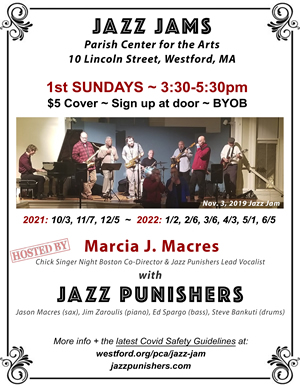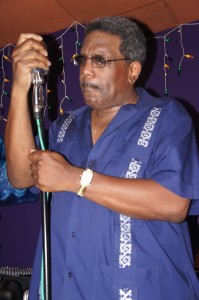 Professor Harp has been on the greater-Boston/New England scene for about four decades. Facing down the trials and tribulations of the music business has earned him the moniker Undaunted Professor Harp. Sticking with it for as long as he has has earned him a lot of respect from his fellow blues and R&B music scene-sters. He still plays all over New England.
Professor Harp has been on the greater-Boston/New England scene for about four decades. Facing down the trials and tribulations of the music business has earned him the moniker Undaunted Professor Harp. Sticking with it for as long as he has has earned him a lot of respect from his fellow blues and R&B music scene-sters. He still plays all over New England.
“I try to keep the boys working, same as always,” he said. “We’re going to play Smoken’ Joe’s on the 12th coming up,” Harp said. Harp and his boys were just at The Blue Print in West Minster. On the 20th he’ll be playing Thai Taste in Dartmouth, Massachusetts. Just less than two weeks ago, Harp and company played at Nelson’s Candy Shop up in Wilton, New Hampshire. This weekend, he’ll be at The Stomping Ground in Putnam, Connecticut and the Narragansett Café in Jamestown, Rhode Island.
“We had a hell of a time last night at Smoken’ Joe’s,” Harp said. “I didn’t have my whole band. I was fronting with Eddie Scheer and Rick Russell with the Tuesday Night All Stars. That came out pretty well. That was a ball. So, I’m still out there just trying to do the thing. Next month, I’ve got to go down to Pawtucket, Connecticut to a place called C.C. O’Brien’s. I’m still just hopping over, the same as I used to been, trying to find them wherever I can find them.”
Among Professor Harp’s summer gigs is Barnful Of Blues Festival in New Boston, New Hampshire on August 2nd. The event is a function of Granite State Blues Society. Harp’s associate Diana Shonk, who has profiled him several times in her publication Blues Audience Newsletter, is on the Board Of Directors and she put his name in contention. It will be his first time playing this festival, at which he‘ll be performing with his regular band.
“I just want to go up there and do the best I can, basically,” he said. “I just want to go up there and just try to kick some ass. I’m looking forward to it. Any good festival, I’ll just play the blues the best I can.”
Harp has been playing New Hampshire for many years, though many of his previous rooms have gone under. He laments the passing of venues like Memphis BBQ & Blues formerly in Milford and Del Vaudo’s formerly in Nashua. Harp occasionally plays a gig with Manchester’s Howard Randall at Pitman’s Freight Room in Laconia.
“I’m still trying to make inroads,” he said. “I might play Wolfeboro if I can get the contacts and the calls but I haven’t heard anything from people up there.”
His last New Hampshire gig was at Nelson’s Candies in Wilton, which he learned of through New Hampshire’s mainstay, Skip Phillbrick, who Harp had played with back in the 1980s. “I heard about them so I thought I’d check it out,” he said. “Hopefully, I’ll be getting another thing up there too.”
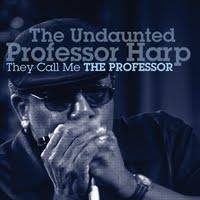 Harp’s heavy work load might reflect the success of his2011 CD They Call Me The Professor recorded at Hogwand Music Studio “Every bit helps,” he said. “’Much obliged‘. That’s the watch word. I’m still trying to sell it. It hasn’t really generated a lot in sales, but it got the acclaim. I’m still trying to get maximum mileage out of it. I don’t have any plans to release another one yet because I want to get maximum mileage out of this one.” Harp has sold close to a thousand copies so far.
Harp’s heavy work load might reflect the success of his2011 CD They Call Me The Professor recorded at Hogwand Music Studio “Every bit helps,” he said. “’Much obliged‘. That’s the watch word. I’m still trying to sell it. It hasn’t really generated a lot in sales, but it got the acclaim. I’m still trying to get maximum mileage out of it. I don’t have any plans to release another one yet because I want to get maximum mileage out of this one.” Harp has sold close to a thousand copies so far.
Harp made the CD because he got a low dollar offer he couldn’t refuse. The Professor got a lot of help from his music friends in Rhode Island when he was working on his recording. He had some of the best producers, engineers, songwriters, and backing musicians the scene has to offer. Title track “They Call Me The Professor“ wasn‘t actually written by Professor Harp. It was composed and penned by his friend Tom Ferraro about the Professor.
“I never say it’s autobiographical, because it’s not. It’s biographical. It was written by Tom Ferraro down in Rhode Island,” he said. “What I tried to do there with this particular CD was to do traditional blues and R&B record.”
Another standout track on They Call Me The Professor is the gripping blues racial protest slow boil “Fightin’ The Battle.” Harp utilized a Leslie speaker to make his harmonica sound like a B3 Hammond Organ. There was also an organ player on the recording, but at his live shows, the Professor dazzles audiences with the vintage blues sounds he blew out of his instrument. He uses a Stomp Box effect to get the sound live.
Harp said that “Fightin’ The Battle” was written by Tom Ferraro, even though it is about Harp‘s life story. “He must have been listening to me what I was saying a long time ago,” Harp said. “But yes, it’s about a lot of my experiences in the music business and out. You meet a lot of people who grin in your face but you never really get support.”
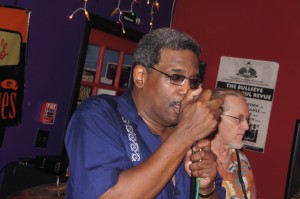 The song is also a heavy commentary about race relations. Harp grew up in a time when things were different and hard for people of color. “The more things change, the more they stay the same,” he said. “It’s not much different today, anyway, really. Things are still going. We don’t live in that post-racial society they talk about. Things have been shuffled to the side a little bit. We don’t have segregated cans to go to. But, I came of age during the Civil Rights struggle. I experienced discrimination in public accommodations and things way back.”
The song is also a heavy commentary about race relations. Harp grew up in a time when things were different and hard for people of color. “The more things change, the more they stay the same,” he said. “It’s not much different today, anyway, really. Things are still going. We don’t live in that post-racial society they talk about. Things have been shuffled to the side a little bit. We don’t have segregated cans to go to. But, I came of age during the Civil Rights struggle. I experienced discrimination in public accommodations and things way back.”
Harp will play “Fightin’ The Battle” at a black club and he unleashes it when he plays big festivals. “I only whip it out every so often,” he said. “I might whip it out when I do another festival. If I get to play some more black clubs or really hip blues festivals, I’m going to use it.”
Professor Harp feels that black artists are marginalized in the music business, even in blues circles. “Why in blues, I don’t know because blacks originated it. I’ve seen that pattern going on for many years. I’m not the only one saying it. There’s a big symposium that goes on at Dominican University in Chicago every year called ‘Blues And The Spirit.’ They address these issues too. I see a lot of times, blacks are marginalized at a lot of blues festivals every where you go. There’s something wrong with that picture.”
Harp said he never discriminates against any person of color or background when he hires musicians and or agrees to play at events. “I’ll play with a Martian if they can play blues right,” Harp said. “But you can’t marginalize and set aside. Black blues musicians are treated like the unwanted step children even though we are the originators of the blues or descendents of the originators. Unfortunately, black Americans, for the most part, have been sold a bill of goods about the blues and have throw it away, I see. If you go to a black music festival, you won’t hardly find a blues band. There’s something wrong with that picture. The blues is the original soul music, and it should be there. We bear a lot of the responsibility too for throwing it away. A lot of the social factors still exist. You may not go to a segregated can or a segregated restaurant or a segregated hotel or a segregated water fountain, but you still have it underground.”
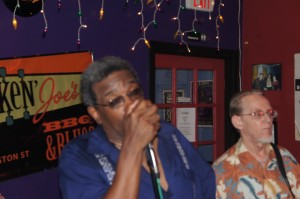 Professor Harp, as always, had plenty to say about modern day racial inequality. He feels that the United States congress is trying to roll back voting rights through gerrymandering black areas so it impacts the vote on election day. He is also concerned about a “right wing supreme court” and he pointed out that the Ku Klux Klan is still around and that there is now skin heads, neo-Nazis, and the Tea Party.
Professor Harp, as always, had plenty to say about modern day racial inequality. He feels that the United States congress is trying to roll back voting rights through gerrymandering black areas so it impacts the vote on election day. He is also concerned about a “right wing supreme court” and he pointed out that the Ku Klux Klan is still around and that there is now skin heads, neo-Nazis, and the Tea Party.
“It’s like a guy once told me when I was about 14,” he said. “You can make forward starts and then you have backwards starts. It’s still there.” Harp concedes that it is good for young black Americans to see a black man in the White House.
“I’m not totally in love with him because I’m not in love with any politician because, unfortunately, I think big money buys them all off. But, I think he’s the best choice out of the choices we’ve had. I know that he’s catching hell for being black because they don’t even respect him right. You have some governor from Arizona pointing a finger a finger in his face like he’s a little child or something. You have a congress pledging to block everything he goes through instead of working with the guy for the good of the country.”
Harp said all this socio-political turmoil began in the late 1960s with presidential candidate Richard Nixon’s southern strategy. “When civil rights started to gain, a lot of the rednecks who were democrat went GOP,” Harp said. “Years ago I’d see a moderate Republican, I’d vote him before I’d vote for a Dixiecrat.”
The Professor’s actual name is Hugh Holmes. He got the Professor moniker from Solomon Burke who he met at the 323 Lounge in Dorchester, Massachusetts in 1975. Harp was wearing gold rimmed glasses that gave him a professorial look. He was also a master of Ebonics. “I guess because of the glasses and the way of speech,” Harp said, “Burke started calling me ‘Professor Harmonica Holmes’ and I cut it to Professor Harp.”
Blues must have been his destiny. Only a few week earlier Harp had lost his “blues virginity” by jamming with Muddy Waters at Paul’s Mall in Boston, across the street from the Prudential Center. “A friend of mine from my old neighborhood in Boston knew him, so he introduced me to him,” Harp said. “I went down to a matinee and Muddy invited me on stage to jam with him. That got to be a regular thing every time Muddy would come to Boston. I used to hang with him and jam with him.”
Like all Harmonica players Harp had to spend time listening to both Walters, Little and Big. Little Walter was the biggest influence on everybody who blows harp. Yet, Harp’s biggest personal influence was George Harmonica Smith. The Professor had a curious encounter with Smith outside a venue. The Professor was in a parking lot, leaning against the same car as Smith, chatting amicably before a show, without even knowing who he was chatting with until Smith hit the stage later on. “Hindsight’s always 40-40,” Harp said.
Harp’s next step is to gain more recognition. He has been working with an agent in Florida, as the Professor has been thinking about snow birding during the winter months. “I’d like to keep these guys working here too,” he said. “I’m getting tired of these New England winters.”
The Professor has for the last year been trying to get his strength back after being surgically cured of first stage cancer. Surgeons removed a kidney to save him. “Luckily, they found it in time so I’m still here,” he said. “One day at a time.”
Hugh Holmes can certainly be called The Undaunted Professor Harp. To see him, please visit his gig page:
http://www.professorharp.com/club.htm
Editor’s note: The Tea Party has never been linked to or associated with neo-Nazis, Skinheads, or the Ku Klux Klan.

